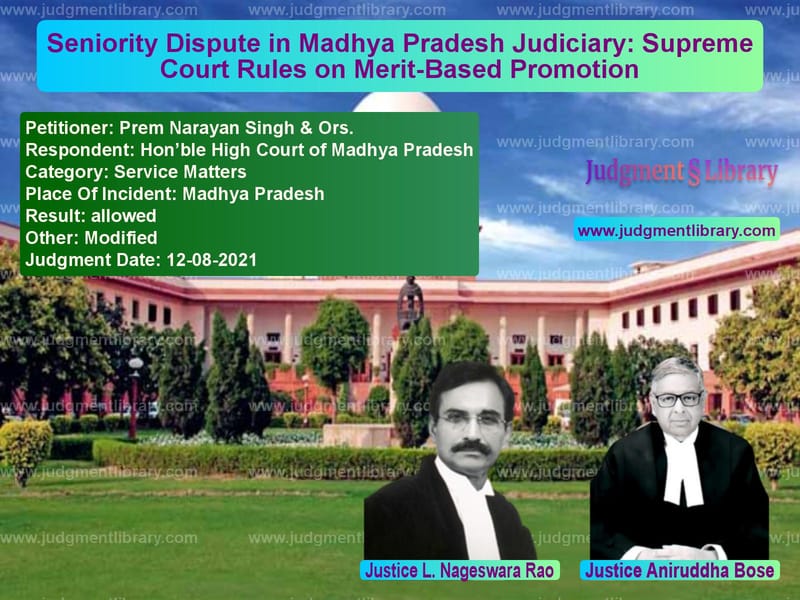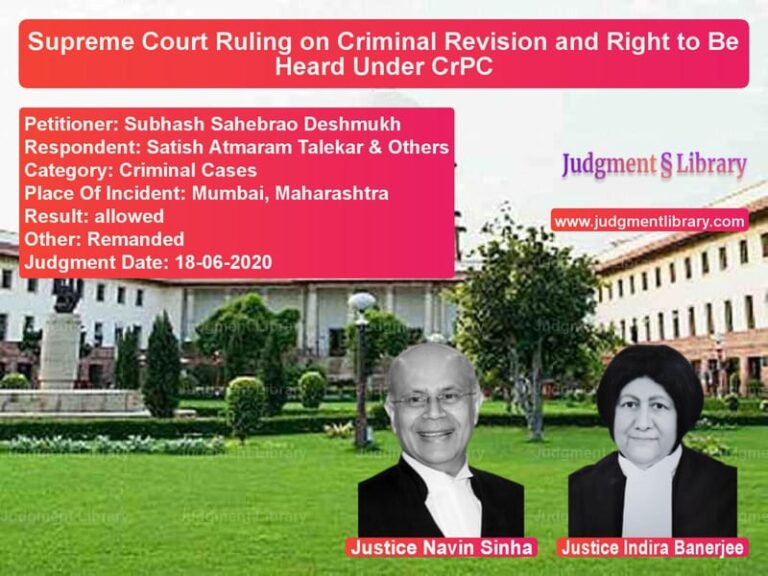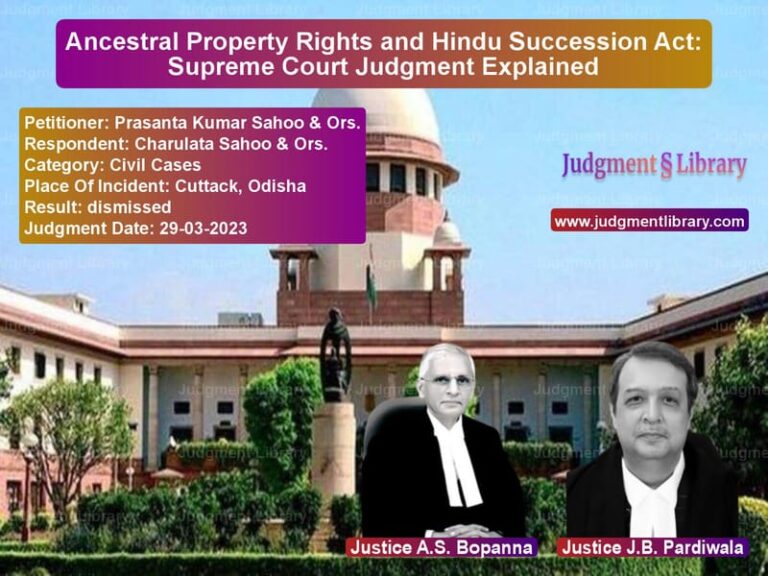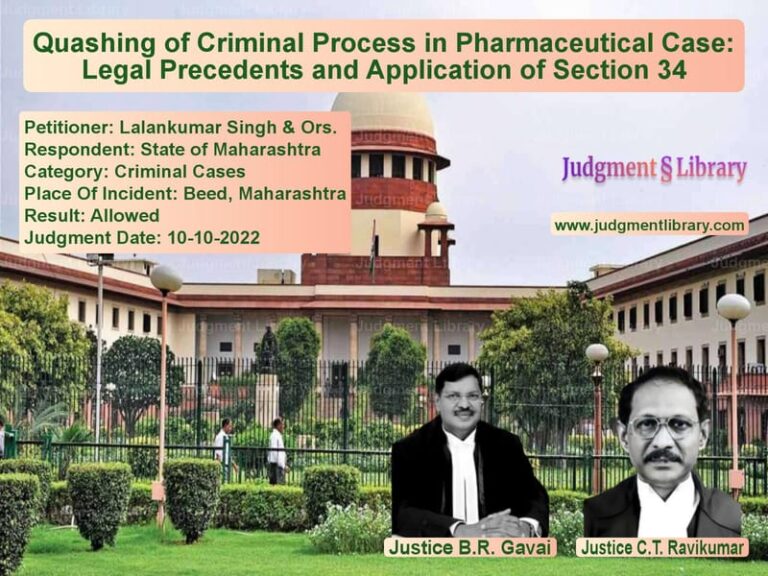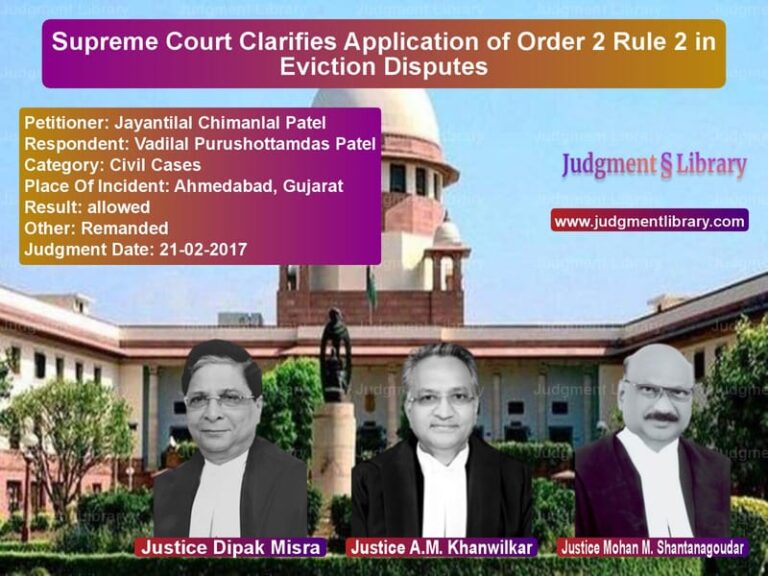Seniority Dispute in Madhya Pradesh Judiciary: Supreme Court Rules on Merit-Based Promotion
The case of Prem Narayan Singh & Ors. vs. Hon’ble High Court of Madhya Pradesh involved a significant dispute regarding the inter-se seniority of District Judges in the Madhya Pradesh Higher Judicial Services (HJS). The Supreme Court had to determine whether the ranking of District Judges promoted through the Limited Competitive Examination (LCE) should be based on merit or their previous seniority in the lower cadre.
Case Background
The petitioners were serving as District Judges in Madhya Pradesh, having been promoted through the LCE mechanism introduced following the Supreme Court’s directions in All India Judges’ Association & Ors. v. Union of India & Ors. The 1994 Madhya Pradesh Higher Judicial Services (Recruitment and Conditions of Service) Rules (hereinafter, ‘1994 Rules’) were amended in 2005 to incorporate LCE as a mode of promotion. Under this system, 25% of promotions were to be granted strictly on merit through the LCE process.
Initially, the High Court of Madhya Pradesh had determined seniority based on merit in the LCE. However, in 2017, the Administrative Committee of the High Court resolved that the ranking of LCE-promoted candidates should be based on their seniority in the lower cadre, not merit. This decision was later ratified by the Full Court, affecting the petitioners’ seniority.
The petitioners challenged this change, arguing that their seniority should continue to be based on merit as determined in the LCE. They contended that the 2017 decision unfairly altered their career progression and was contrary to previous rulings.
Arguments by the Petitioners
- The Supreme Court had previously ruled in All India Judges’ Association that LCE was meant to be an incentive for junior officers to compete based on merit.
- “The seniority of LCE-selected judges should be determined by their performance in the competitive examination rather than their standing in the lower cadre,” argued the petitioners.
- The resolution by the High Court’s Administrative Committee and its subsequent approval by the Full Court went against the very purpose of introducing LCE-based promotions.
- “The decision to determine seniority based on previous cadre ranking effectively negates the competitive nature of LCE and reduces it to a mere qualifying exam.”
- The petitioners also cited the Supreme Court’s ruling in Dinesh Kumar Gupta & Ors. v. Hon’ble High Court of Judicature of Rajasthan & Ors., where the Court had upheld that inter-se seniority should be based on merit.
Arguments by the Respondents (High Court of Madhya Pradesh)
- The respondents argued that the 2017 decision aimed to maintain uniformity and fairness in seniority determination.
- “Inter-se seniority should not be affected by merit in the LCE; instead, it should reflect the candidate’s seniority in the feeder cadre,” contended the respondents.
- The High Court defended its resolution by stating that the primary objective of LCE was to test suitability rather than alter seniority rankings.
- “If seniority is determined solely based on merit, it would disrupt the hierarchical structure and undermine the experience of those serving longer in the judiciary.”
Supreme Court’s Analysis
The Supreme Court examined two critical issues:
1. Was the High Court justified in altering the method of seniority determination for LCE promotions?
- The Court ruled that the 2017 resolution of the Administrative Committee was contrary to established legal principles.
- “The fundamental objective of introducing LCE was to reward merit, and altering the seniority criteria to favor previous cadre rankings defeats this purpose.”
2. Should the seniority of LCE-promoted judges be determined by merit or their lower cadre ranking?
- The Court found that the established principle under Dinesh Kumar Gupta mandated that seniority within LCE-selected judges should be based on merit.
- “LCE was introduced to create an avenue for meritorious officers to accelerate their career growth, not to maintain the status quo of previous seniority in lower cadres.”
Supreme Court’s Judgment
The Supreme Court ruled:
- “The resolution of the Administrative Committee dated 14.12.2017 and its subsequent ratification by the Full Court is set aside.”
- “The seniority of District Judges promoted through LCE shall be based on merit as determined in the examination, not on their previous cadre ranking.”
- “The gradation list dated 01.02.2019 shall be revised in accordance with this judgment.”
Conclusion
The Supreme Court’s ruling upholds the principle of merit-based promotion and reinforces the integrity of the LCE system. The judgment ensures that judicial officers who excel in competitive examinations are fairly ranked, fostering a culture of excellence within the judiciary.
Petitioner Name: Prem Narayan Singh & Ors..Respondent Name: Hon’ble High Court of Madhya Pradesh.Judgment By: Justice L. Nageswara Rao, Justice Aniruddha Bose.Place Of Incident: Madhya Pradesh.Judgment Date: 12-08-2021.
Don’t miss out on the full details! Download the complete judgment in PDF format below and gain valuable insights instantly!
Download Judgment: prem-narayan-singh-&-vs-hon’ble-high-court-o-supreme-court-of-india-judgment-dated-12-08-2021.pdf
Directly Download Judgment: Directly download this Judgment
See all petitions in Promotion Cases
See all petitions in Recruitment Policies
See all petitions in Public Sector Employees
See all petitions in Judgment by L. Nageswara Rao
See all petitions in Judgment by Aniruddha Bose
See all petitions in allowed
See all petitions in Modified
See all petitions in supreme court of India judgments August 2021
See all petitions in 2021 judgments
See all posts in Service Matters Category
See all allowed petitions in Service Matters Category
See all Dismissed petitions in Service Matters Category
See all partially allowed petitions in Service Matters Category

